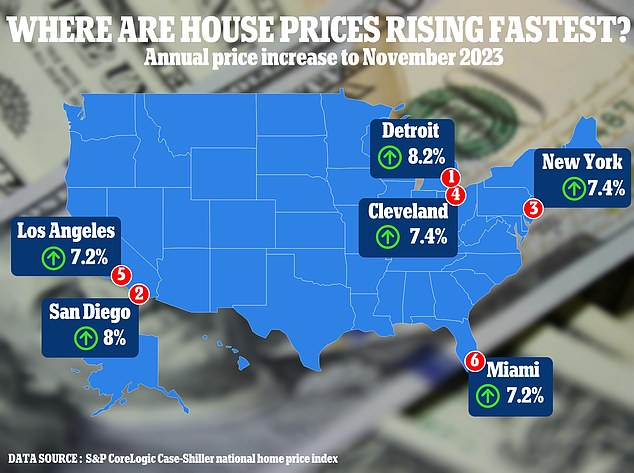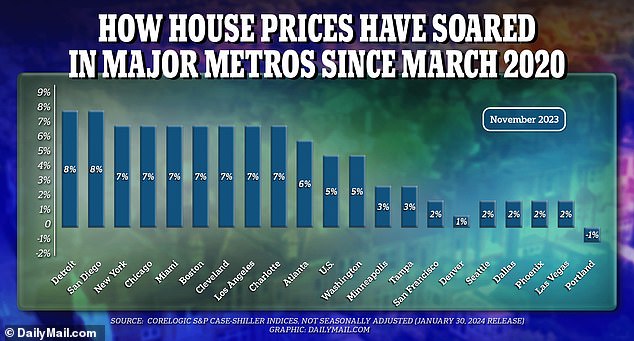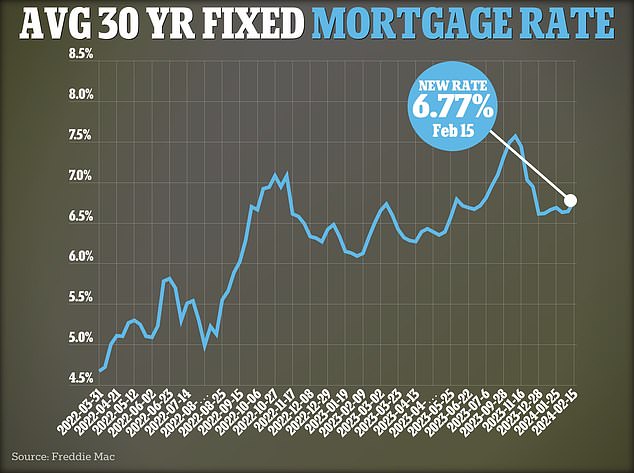The end of the pandemic housing bubble! Analyst once dubbed ‘the Oracle of Wall Street’ predicts house prices will FINALLY fall – but only in these states
- Meredith Whitney accurately predicted the 2008 financial crisis
- Now she claims the US housing market is in the midst of a major shift
- It marks a reversal in the pandemic-inspired housing boom
The U.S. real estate landscape is in the midst of a major upheaval that will make homes more affordable for first-time buyers, a former Oppenheimer analyst claims.
Meredith Whitney was nicknamed the ‘Oracle of Wall Street’ after she accurately predicted the 2008 financial crisis.
Now she claims house prices are on the verge of a fall after the pandemic caused a boom in the property sector, with the average property value rising by more than $100,000 in less than four years.
However, she said the trend will be geo-specific, with states like New York, New Jersey and Ohio among the hardest hit. By comparison, homes in Texas, Tennessee and Utah are among the states that will remain strong.
The shift will be driven by a wave of baby boomers moving into smaller properties, freeing up inventory and lowering costs for first-time buyers, Whitney said.
Meredith Whitney, pictured, was nicknamed the ‘Oracle of Wall Street’ after accurately predicting the 2008 financial crisis

In the year to November 2023, Detroit property prices rose 8.2 per cent, according to the latest data from the main benchmark for US house prices

A recent report from CoreLogic shows how real estate prices have increased in certain US metro areas
She told DailyMail.com: ‘About 90 percent of the housing stock is owned by the over-40s, while 74 percent is owned by the over-50s.
‘It is logical that many of these owners will downsize over the next ten years. That’s almost 35 million homes; it’s a huge number that has to go through the system.
“My advice to homeowners is, if you want to sell, it’s better to do it sooner rather than later.”
During the pandemic, the median home price in the US rose from $303,465 in March 2020 to $402,045 in December 2023. Redfin show numbers.
Many families were caught up in a so-called ‘race for space’ as they looked for larger homes and gardens in which to spend the lockdown. A widespread shift to working from home has also separated workers from their city center properties.
But home prices have remained high since then, despite mortgage rates soaring in response to Federal Reserve interest rates hitting a 22-year high.
The average interest rate on a 30-year mortgage currently hovers at 6.77 – about double what they were two years ago, according to figures from government-backed lender Freddie Mac.
In a normal market, this would be sufficient to dampen demand for housing and thus keep prices down. However, several experts have noted that a widespread housing shortage in the US has kept home values artificially high.

Whitney told DailyMail.com: ‘My advice to homeowners is: if you want to sell, it’s better to do it sooner rather than later.’

The average interest rate on a 30-year fixed home loan reached 6.77 percent, up from 6.64 percent last week, according to figures from government-backed lender Freddie Mac.
Redfin data shows that the average American homeowner now spends twice as long in his or her property as he did in 2005.
Today, an owner can expect to spend 11.9 years in the same property, compared to 6.5 years 20 years ago.
Whitney emphasizes that there will not be a ‘crash’ in house prices, but rather an overdue correction.
She notes that homeowners have built $21 trillion in equity in their homes over the past decade. So a price drop is unlikely to seriously harm them.
And some markets will do much better than others.
She said: “Every sixty years, from an economic perspective, we see a similar kind of seismic shift in the American economy.
“Today we see companies shifting to tax-friendly states across the Sunbelt and in Texas, Tennessee and North Carolina. These are the housing markets where growth will continue.
“But New York, New Jersey, Ohio and Illinois will see population outmigration, which means there will be no growth in their housing markets.”
